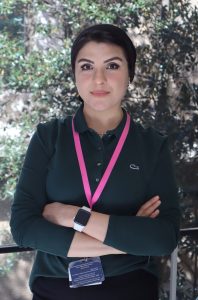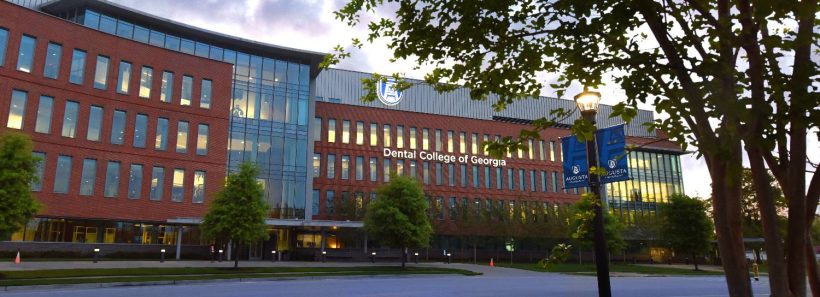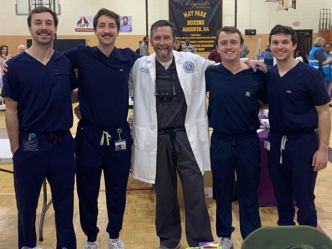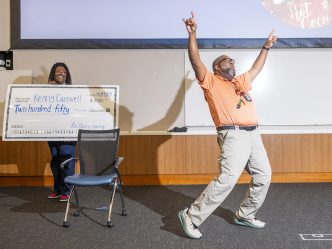 Dr. Ranya El Sayed, Assistant Professor of Periodontics, has been awarded a $2.8 million grant from the National Institute on Aging (NIA) to lead a study on connection between periodontitis (gum disease) and Alzheimer’s disease.
Dr. Ranya El Sayed, Assistant Professor of Periodontics, has been awarded a $2.8 million grant from the National Institute on Aging (NIA) to lead a study on connection between periodontitis (gum disease) and Alzheimer’s disease.
This study aims to explore the link between periodontal infections and increased risk of dementia, focusing on the potential mechanisms by which oral pathogens may invade the central nervous system.
Now, with this R01 grant entitled, “The role of oral microbially induced exosomes in Alzheimer’s disease pathogenesis,” they hope to answer important, long-standing questions.
Joining Dr. Elsayed as co-investigators on the grant are, Dr. Mahmoud Elashiry, Assistant Professor of Periodontics at the DCG; Dr. Qin Wang, Professor at the Medical College of Georgia Department of Neuroscience and Regenerative Medicine and Director of Program for Alzheimer’s Therapeutic Discovery; Dr. Alexis Stranahan, Associate Professor at the MCG Department of Neuroscience and Regenerative Medicine; Dr. Jie Chen, MCG Professor of Biostatistics and Data Science, Department of Biostatistics, Data Science and Epidemiology (BDSE); and Dr. Allan Levey, Professor of Psychiatry & Behavioral Sciences at Emory University.
“Research shows a significant relationship between gum disease and Alzheimer’s disease, but the biological reasons and mechanisms underlying this link are not yet understood. A protein from P. gingivalis, a known periodontal pathogen, was detected in the brains of deceased Alzheimer’s patients. But we don’t know how it happens. Is it simply an association, or is there a direct cause and effect?” El Sayed said.
Dr. Elsayed and her team believe that infections of the gums caused by p. gingivalis result in the release of small particles called exosomes within in the mouths of patients with gum disease. These particles travel through the gums, causing inflammation and bone loss, eventually entering the bloodstream. Due to their small size, they can cross the blood-brain barrier – the brain’s protective membrane – and enter the brain tissue. There, they are taken up by the brains’ immune cells, causing inflammation, and ultimately leading to neuron degeneration.
To test this, researchers will use mouse models. They will induce periodontitis in one group of mice and then transfer extracted particles from infected tissue to another group. Finally, they will monitor the behavior of the mice for signs of dementia.
“Our preliminary experiments have shown promise,” says El Sayed.
Researchers hope that answering the “how” of this process will enable patients to put precautions in place. Periodontal disease affects nearly half of the U.S. population, with 10% having a severe form. But Alzheimer’s disease is complex, arising from a mix of causes like genetics, inflammation and harmful protein buildup in the brain.
“This is the work of years by Dr. El Sayed and her team; and a great achievement for Augusta University in general and the DCG,” Dr. Elashiry said. “When we understand how these processes intersect, it will be easier to find a cure later.”
Although researchers don’t have definitive proof that p. gingivalis directly causes Alzheimer’s, researchers believe that the bacteria might make people with gum disease, who are already at risk genetically, more susceptible to developing the disease.
“The NIH R01 award is a significant achievement for Dr. El Sayed and a proud milestone for the Dental College of Georgia,” said Dr. Babak Baban, Associate Dean for Research. “This recognition underscores the vital role of funding in advancing innovative, transdisciplinary research that bridges oral health and systemic diseases. The Center for Excellence in Research, Scholarship, and Innovation (CERSI) at our college is dedicated to nurturing such impactful research, fostering collaboration and driving progress in both dental and biomedical sciences to tackle pressing health challenges.
Consultants on this project are Dr. Yutao Liu and Dr. Mark Hamrick, professors at the MCG Department of Cellular Biology and Anatomy; Dr. Alvin Terry, professor and chair of MCG Department of Pharmacology and Toxicology; and Dr. Christopher Cutler, professor emeritus at DCG Periodontics Department.
Alzheimer’s disease is currently the sixth leading cause of death in the U.S., but the exact process by which the disease develops and progresses remains unknown.
 Augusta University
Augusta University




